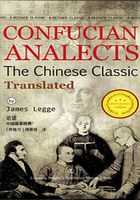
CHAPTER 5
1. The Master said, "Riches and honors are what men desire. If it cannot be obtained in the proper way, they should not be held. Poverty and meanness are what men dislike. If it cannot be obtained in the proper way, they should not be avoided.
2. "If a superior man abandon virtue, how can he fulfill the requirements of that name?
3. "The superior man does not, even for the space of a single meal, act contrary to virtue. In moments of haste, he cleaves to it. In seasons of danger, he cleaves to it."
3. ONLY IN THE GOOD MAN ARE EMOTIONS OF LOVE AND HATRED RIGHT. This ch. containing an important truth, is incorporated with the 大学传, x.15. 好 and 恶 (read woo) are both verbs, up.3d tone.
4. THE VIRTUOUS WILL PRESERVES FROM ALL WICKEDNESS. 苟=诚, not merely—'if', but 'if really'. Comp. the apostle's sentiment, 1. Jonn, iii. 9, 'Whosoever is born of God doth not commit sin'.
5. THE DEVOTION OF THE KEUN-TSZE TO VIRTUE. 1. For the antecedent to之in the recurring得之, we are to look to the foll. verbs, 处(up.2d tone) and 去. We might translate the first 不以道得之, 'if they cannot be obtained, &c.', but this would not suit the second case. 其道, 'the way', i.e., the proper way. If we supply a nom. to 处 and 去, it must be 君子.—He will not 'abide in', nor 'go away from', riches and honours. 2. 恶, read woo, up.1st tone, 'how'. 名, 'name', not reputation, but the name of a keun-tsze, which he bears. 3. 终食之间, 'The space in which a meal can be finished'; 造次 (interch. with 草次) and 颠沛 are wellknown expression, the former for haste and confusion, the latter for change and danger, but it is not easy to trace the attaching of those meanings to the characters. 颠, 'to fall down', and 沛, the same, but the for. with the face up, the other with the face down. 必于是, Comp. Horace's 'Omnis in hoc sum'.
